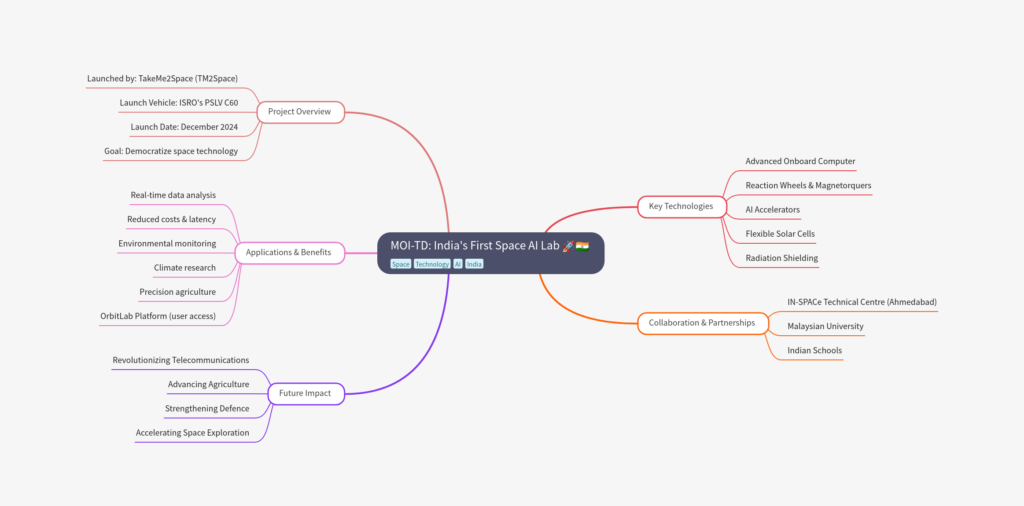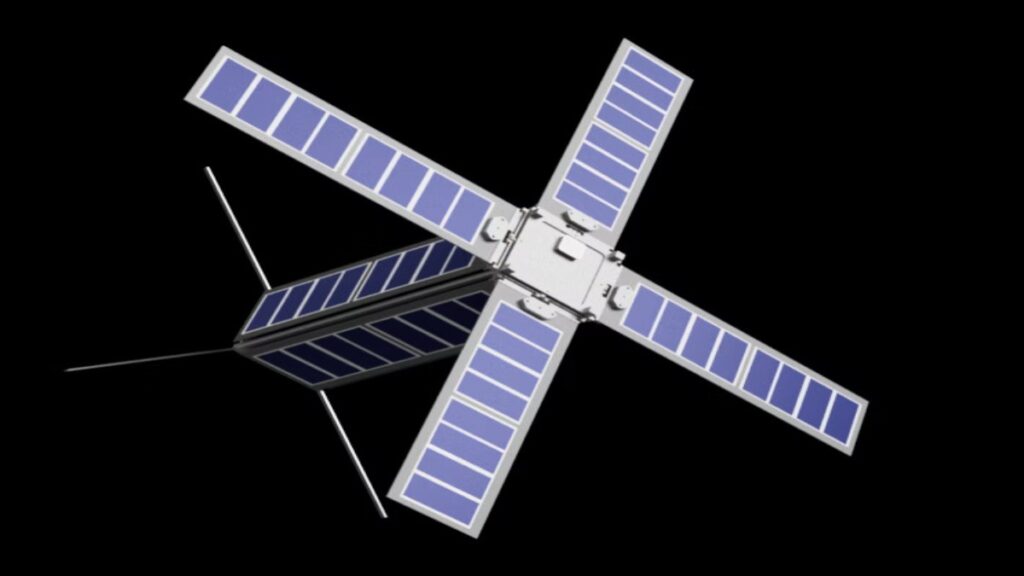Table of Contents

Introduction
India is set to achieve yet another milestone in its journey toward becoming a global space superpower. Hyderabad-based TakeMe2Space (TM2Space) is preparing to launch MOI-TD (My Orbital Infrastructure – Technology Demonstrator) aboard ISRO’s PSLV C60 rocket in December 2024. This initiative, India’s first-ever AI laboratory in space, signifies a paradigm shift in space research and technology. By integrating artificial intelligence (AI) with orbital infrastructure, TM2Space aims to make space research more accessible, cost-efficient, and inclusive.
This article explores how the MOI-TD project addresses challenges in space research, the technological breakthroughs it represents, and its potential impact on industries and space exploration.
The Vision Behind MOI-TD

TM2Space is driven by a vision to democratize space technology. Known for its innovative work with nano-satellites, the company is leveraging Artificial Intelligence to resolve long-standing inefficiencies in data processing and transmission in space. MOI-TD, as a technological demonstrator, embodies this mission by enabling real-time, in-orbit data analysis.
This approach drastically reduces costs and latency, which are often the biggest hurdles in space research. Traditional satellite systems transmit terabytes of raw data to Earth for processing, a process fraught with delays and inefficiencies. MOI-TD’s ability to process data directly in orbit ensures that only the most critical and actionable insights are transmitted back to Earth.
Key Collaboration and Development
The development of MOI-TD was made possible through a collaboration with the IN-SPACe Technical Centre in Ahmedabad. This government-supported agency provides a single-window framework for private space activities in India. TM2Space utilized IN-SPACe’s cutting-edge satellite testing facilities, enabling comprehensive evaluation and refinement of MOI-TD’s design and functionality.
Such public-private collaborations are pivotal for advancing India’s space sector, fostering an ecosystem where innovation thrives. The partnership also underscores India’s commitment to integrating private enterprises into its space research agenda.
Revolutionary Data Processing in Space
One of MOI-TD’s standout features is its ability to address inefficiencies in satellite data transmission. According to experts, nearly 40% of data transmitted from satellites is often redundant or unusable. Traditional systems require this data to be transmitted to ground stations for processing, which involves significant resource expenditure.
MOI-TD eliminates this bottleneck by processing raw data onboard the satellite itself. Key benefits include:
- Real-Time Insights: Immediate analysis of data for actionable insights.
- Reduced Costs: Lower transmission costs by filtering out irrelevant data.
- Enhanced Efficiency: Optimized use of bandwidth and storage resources.
These capabilities pave the way for innovations in fields like environmental monitoring, disaster management, and telecommunications.
Innovative Applications and Accessibility
MOI-TD is not just for scientists and researchers; its applications are designed to be accessible to a broad spectrum of users, from leading universities to school students. TM2Space has developed a platform called OrbitLab, which allows users to upload and test their AI models directly on the MOI-TD infrastructure.
Some of the notable use cases include:
- Environmental Monitoring: Real-time tracking of deforestation and greenhouse gas emissions.
- Climate Research: Detailed analysis of climate patterns to predict natural disasters.
- Agriculture: Precision farming through advanced monitoring of crop health.
TM2Space has already partnered with a leading Malaysian university and several Indian schools, demonstrating the platform’s versatility and potential for democratizing space research.
Technological Edge
The MOI-TD platform incorporates state-of-the-art technologies that set it apart from conventional satellite systems:
- Advanced Onboard Computer: Designed to handle AI workloads in space, ensuring robust and efficient data processing.
- Reaction Wheels and Magnetorquers: Provide precise attitude control, enabling stable operations.
- AI Accelerators: Enhance the computational capabilities of the onboard systems, making them suitable for machine learning models.
- Flexible Solar Cells: Power the lab sustainably, even in the harsh conditions of space.
- Radiation Shielding: Protects sensitive components from the effects of cosmic radiation.
These features not only ensure MOI-TD’s functionality as a technology demonstrator but also lay the foundation for future orbital data centers that could replace energy-intensive terrestrial systems.
Future Impact on Industries
The introduction of AI-based orbital infrastructure has the potential to revolutionize several industries:
- Telecommunications: Real-time data processing in orbit could improve connectivity and reduce network latency.
- Agriculture: Enhanced crop monitoring and yield predictions can help optimize farming practices.
- Defence: Advanced surveillance capabilities can strengthen national security.
- Space Exploration: AI-driven analysis can accelerate discoveries and optimize space missions.
While the initial costs of such technology remain high, initiatives like MOI-TD create a roadmap for scalable, cost-effective, and environmentally friendly solutions in space technology.
The Role of Private Enterprises in Shaping India’s Space Future
The launch of MOI-TD underscores the growing role of private enterprises in India’s space exploration efforts. Companies like TM2Space are complementing ISRO’s work by focusing on niche technologies that can transform how space is utilized.
This collaboration highlights India’s shift toward a more inclusive space program, where government agencies and private players work together to achieve common goals.
Challenges and Opportunities
Challenges:
- High Initial Costs: Developing and deploying such advanced systems is resource-intensive.
- Regulatory Hurdles: Navigating the complex regulatory environment can be challenging for private companies.
- Technical Risks: The harsh conditions of space pose significant challenges to the durability and performance of onboard systems.
Opportunities:
- Market Expansion: As costs decrease, more organizations will be able to participate in space research.
- Global Collaboration: The technology has the potential to attract international partnerships.
- Educational Impact: Platforms like OrbitLab can inspire the next generation of scientists and engineers.
Looking Ahead
MOI-TD is more than just a technological demonstration. it is a symbol of India’s growing capability in the global space arena. By integrating AI into orbital research, TM2Space is setting the stage for a future where space exploration is not only more efficient but also more inclusive.
The success of MOI-TD could lead to the development of larger-scale orbital data centers, which would offer sustainable alternatives to Earth-based data processing facilities. As India’s first space AI lab, MOI-TD is poised to inspire countless innovations, transforming industries and improving lives.
FAQs
1. What is MOI-TD?
Ans: My Orbital Infrastructure – Technology Demonstrator is India’s first AI lab in space, designed to process data directly in orbit, reducing transmission costs and latency.
2. Who developed MOI-TD?
Ans: MOI-TD was developed by Hyderabad-based space tech company TM2Space, in collaboration with the IN-SPACe Technical Centre in Ahmedabad.
3. How does MOI-TD improve data processing?
Ans: MOI-TD processes raw data onboard the satellite, eliminating redundant data and delivering real-time actionable insights, thereby reducing transmission costs and inefficiencies.
4. What are some applications of MOI-TD?
Ans: MOI-TD supports environmental monitoring, climate research, agriculture optimization, and education through its platform, OrbitLab.
5. Why is MOI-TD significant for India?
Ans: MOI-TD represents a pivotal step in India’s space innovation, highlighting the role of private enterprises and AI in advancing the country’s space capabilities.
With a focus on precision and reliability, BWER offers state-of-the-art weighbridge systems to Iraq’s industries, meeting international standards and supporting operational efficiency.
Glue Dream strain very informative articles or reviews at this time.